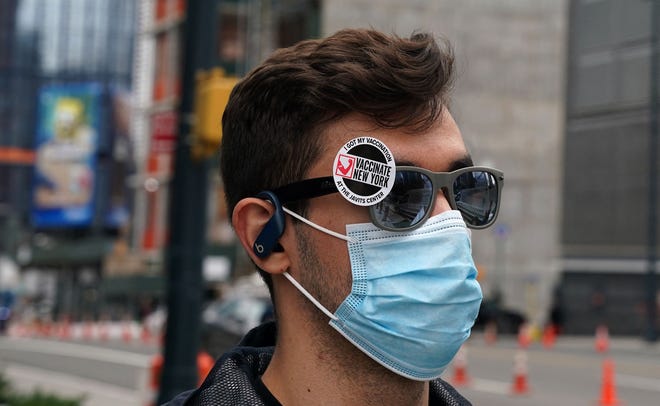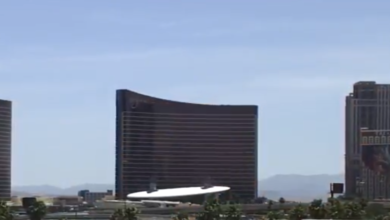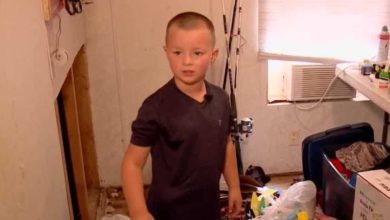
When the news was just a headline, there seemed a collective gasp.
Use of the Johnson & Johnson vaccine, the only single-dose shot for COVID-19, which has been administered to nearly 7 million people in the U.S., was paused so federal health officials could review data involving six reported cases of a rare and severe type of blood clot. People wondered what this one-in-a million risk meant for the health of those who'd already received the shot, for those scheduled to get it, for the vaccine hesitant, and for our collective hope life was on track to resume again.
Hours later, many questions were answered: Anyone who received the J&J shot a month ago is at very low risk of developing complications, and those who received the shot more recently can monitor for specific symptoms. In some states, people with J&J appointments were told they'd be given Moderna or Pfizer instead. Federal officials said the pause should have little impact on vaccine availability.

But uncertainty still looms, namely around the fate of the J&J shot as well as how this pause may impact those who weren't sure they wanted the shot in the first place. The announcement seemed to shatter an illusion of smooth sailing ahead, even if experts say this is exactly how science works. For a pandemic-weary nation, the pause was an unwelcome setback.
"For those of us who pay attention to science and have for most of our lives, we can appreciate the fact that science is not linear. What we learn evolves," said Lynn Bufka, senior director for practice transformation and quality at the American Psychological Association. "But because as a world, we have really been focused on vaccination as perhaps a ticket, if not the ticket, towards returning to a life that approaches more of what we'd like to be doing more comfortably and freely, now we are reconciling all the hopes we pinned on the vaccine with the reality of how science works."
Experts:'Don't panic' over Johnson & Johnson vaccine pause
Coping with continued uncertainty, and managing anxiety
Uncertainty has been a defining feature of COVID, but more recently, especially as vaccinations increased, there was a feeling that we better understood the path forward than ever before. Cases remained stable, and while health experts cautioned we weren't in the clear, it seemed we were closer than ever to ending a pandemic that cost over 560,000 American lives.
Health experts say the J&J pause is no reason to panic – forward momentum is likely to continue – but it adds to uncertainty at time when our tolerance for uncertainty feels exhausted. It disrupts the largely positive vaccine narrative, adding a new and unnerving hurdle.
Q&A:What do I do if I've gotten the Johnson & Johnson COVID-19 shot? Your questions, answered
Bufka said to manage anxiety, it can be helpful for people to remind themselves that they continue to make the best decisions with the information available.
"We make decisions like this all the time," she said. "We choose to drive somewhere. There are risks associated with being in a car, but most of us don't worry about that on a daily basis, because we've accepted those risks as part of the price of getting where we want to go."
'My heart dropped': Fears about increased vaccine hesitancy
Some health experts worry the J&J pause may fuel vaccine hesitancy. Many people already tend to underestimate the risks of infection and overestimate the risks of vaccines.
"My heart dropped because it's not good in any way," said Jay Van Bavel, an associate professor of psychology and neural science at New York University who has studied vaccine hesitancy.
Van Bavel wondered if this might be that one rare instance, in the middle of a pandemic, when pausing may cause more harm than good.
"The rules we have defined might not be well-designed for this particular situation," he said.
Jennifer Reich, a sociology professor at the University of Colorado Denver whose research focuses on how people make decisions about vaccines, said the pause is verification that vaccine systems work well and gives the FDA an opportunity to make sure "vaccines remain exquisitely safe."
Even with a highly powered clinical trial, she said, you can only learn so much with 30,000 participants.
"What's challenging is that collectively we've seen vaccine hesitancy going down around COVID vaccine use. We've seen increasing enthusiasm, because we hit the year mark, and everyone is really tired and really wants a solution," she said. "This feels disappointing."
'A really rare event'
Experts say it's important to keep the J&J pause in perspective.
“This is a really rare event … It’s six out of the 6.85 million doses, which is less than one in a million,” Anthony Fauci, the nation’s leading infectious disease expert, said during a White House briefing Tuesday.
For people who have yet to be vaccinated, experts say their best advice is to "shift" to another vaccine. Moderna and Pfizer-BioNTech vaccines have been administered to even more people and are proven safe.
Analysis:Comparing the COVID-19 vaccines
"The ability to sit with uncertainty and to recognize that we still have choices we can make and still have control over most of our lives is important," Bufka said. "That will help us with all the rest of the curveballs that are going to come at us, whether they're COVID-related or not."
Source link









